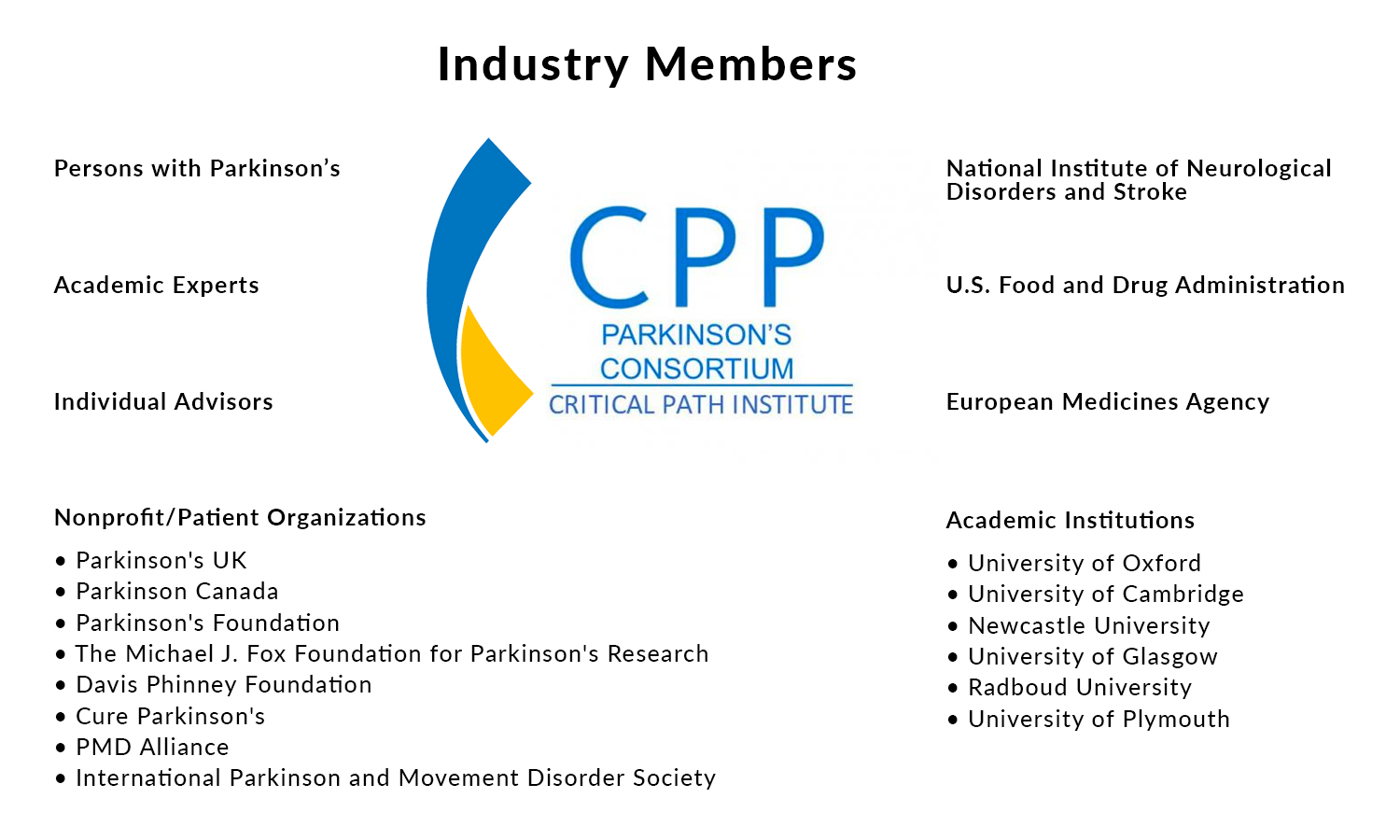 VOLUME 27, ISSUE 1 • MARCH 2023 Full issue »
VOLUME 27, ISSUE 1 • MARCH 2023 Full issue »

The Critical Path for Parkinson’s Consortium: A collaborative multistakeholder public-private partnership to improve the health of people living with Parkinson’s disease.
The Critical Path for Parkinson’s Consortium (CPP) is part of the nonprofit Critical Path Institute public-private partnership. CPP is one of many precompetitive consortia of Critical Path Institute and is driven by the mission of accelerating the development of innovative tools to enhance the efficiency of drug development for PD therapeutics.
CPP serves as a leading international consortium to collectively advance data-driven collaborative research under the advisement of global regulatory health agencies. CPP facilitates collaborative efforts between pharmaceutical industry members, academic stakeholders, patients and patient advocates, and scientific advisors, including members from the International Parkinson and Movement Disorders Society (MDS), with the goal to improve the health of people with Parkinson’s disease (Figure).
The consortium is led by Diane Stephenson, PhD, Executive Director and Martijn Müller, PhD, Senior Scientific Director.

Figure. Overview of relevant stakeholders involved in the Critical Path for Parkinson's Consortium (CPP).
CPP was founded in 2015 with generous support from Parkinson’s UK. As a rapidly growing neurological disease with a significant projected increase of new PD cases over the next several decades worldwide, there is an urgent need to develop drugs that slow or halt the progression of disease.
Although there is a sense of optimism about the number of promising candidates that could advance to the clinic, progress is hampered by the development of tools, such as quantitative models, separately by different groups on single studies and limited datasets. From the onset, one of the goals of CPP was to create a clinical trial simulation (CTS) platform that could be used by clinical trial sponsors to optimize the design of trials, in particular those trials that are aimed at disease modification in the early stages of disease.
To understand if a drug is effective in altering disease progression, the natural progression of the disease needs to be understood. A disease progression model based on the commonly used clinical outcome assessment the Movement Disorders Society-revised Unified Parkinson’s Disease Rating Scale (MDS-UPDRS) forms the backbone of the CTS platform. The disease progression model was developed in a data-driven manner by harmonizing patient-level and item-level clinical data from natural history studies and clinical trials in CPP’s Unified Clinical Database.
The European Medicines Agency (EMA) recently endorsed further development of this CTS platform by providing a letter of support. This will allow the CPP team to continue enhancing quantitative novel methodologies in drug development, while also encouraging the consortium to disseminate and provide access to the current version of the model for implementation by sponsors actively designing PD clinical trials.
The development of a CTS platform was not the only success of CPP. Since the start of the consortium, CPP’s Unified Clinical Database has been the source for several data-driven projects. For example, by leveraging the database, CPP received a qualification opinion by the EMA and a letter of support by the US Food and Drug Administration (FDA) for dopamine transporter (DAT) SPECT as an enrichment biomarker for clinical trials by excluding trial participants that do not show DAT SPECT evidence of a dopaminergic denervation pattern typical of PD (so-called SWEDD participants). A publicly available CTS tool was developed to aid in the design of PD trials targeting early stages of the disease based on DAT SPECT determination of SWEDD status. The database was also leveraged by members to estimate both motor and non-motor disease progression in people living with Parkinson’s who carry the LRRK2 genetic polymorphisms.
Currently CPP’s consortium endeavors are focused on advancing the regulatory maturity of digital health technologies for use in drug development, developing a landscape analysis of biomarkers fit-for-purpose in PD drug development, and serving as a conduit in a multi-stakeholder effort to the development of a patient-centered clinical outcome assessment.
CPP is one of many neuroscience programs led by the Critical Path Institute, which includes the Critical Path for Alzheimer’s Disease (CPAD), Huntington’s Disease Regulatory Science Consortium (HD-RSC), the Duchenne Regulatory Science Consortium (D-RSC), and the Critical Path to Therapeutics for the Ataxias (CPTA). Other (rare) neurodegenerative diseases characterized by movement disorders such as progressive nuclear palsy and amyotrophic lateral sclerosis are covered under the Critical Path for Rare Neurodegenerative Diseases (CP-RND) and the Rare Disease Cures Accelerator Data and Analytics Platform (RDCA-DAP). Collectively, these consortia operate with the goal of improving human health by developing regulatory endorsed tools in a data-driven manner. The acquisition, harmonization, and integration of data is imperative in developing these tools.
A crucial aspect in accelerating the deployment of therapeutic PD treatments in the market is the involvement of people living with Parkinson’s disease. The Critical Path for Parkinson’s Consortium is a world-class leader in developing patient-centered collaborations to share data and expertise for the creation of tangible solutions for drug development that can be used with confidence within the demands of regulatory rigor.
Read more Moving Along:






